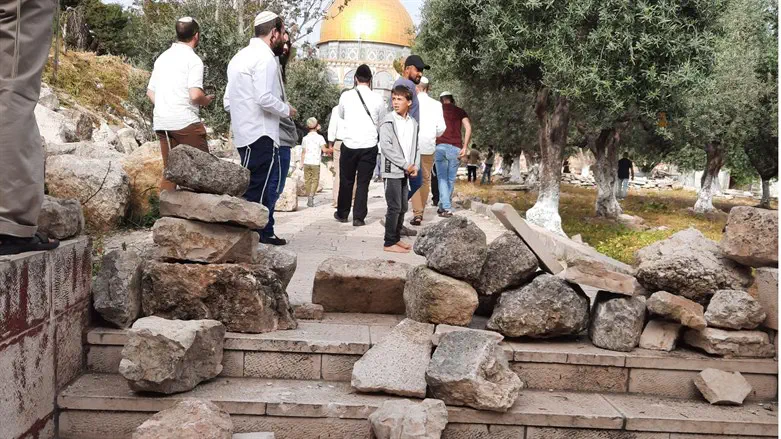
The Israel Police today filed an appeal with the Jerusalem District Court against the decision of the Jerusalem Magistrate's court, under which Jews are allowed to say the Shema prayer and bow on the Temple Mount.
According to a report by Channel 12 News, the police are seeking to overturn the Magistrate's Court's decision because it erred in "drawing conclusions about government policy regarding the rules of conduct on the Temple Mount based on an online journalist's report."
The appeal states that the case is related to a visit to the Temple Mount by four Jewish youths on 'Nakba Day.' The youths agreed to abide by the conditions applied to Jews on the Temple Mount, included the banning of any and all forms of prayer. However, during their visit, they shouted the 'Shema' prayer and then opposed the police. They were arrested and given a 15-day restraining order from the Old City. The police's claim in the application for the restrictive conditions was that their conduct may lead to a violation of public order.
The teens filed an appeal against the order and Jerusalem Magistrates Judge Zion Saharai ordered the end of restrictive conditions imposed on them by the police.
The police claim that Judge Saharai erred in his ruling that the youths' behavior did not constitute a violation of the public order. "The material of the investigation documents the conduct of the respondents which constitutes a disturbance to the police officer in the performance of his duties in two stages," the appeal reads. "First - in violation of the explicit rules given to the respondents by a policewoman at the briefing, only a few minutes before violently violating these instructions. Secondly - the respondents interfered with the police officers in the performance of their duties even after the act - when they proceeded to bow, shouting 'shame on you' and two of them did not comply with the police officers' instructions."
"The actions of the respondents in a sensitive and complex place like the Temple Mount, which took place during a tense period, during which violent riots occurred on the Temple Mount and elsewhere in Jerusalem, at the sensitive time 'Nakba Day', in public and on camera, these are actions which may establish a suspicion of a potential offense which may lead to a disruption of the public order."
